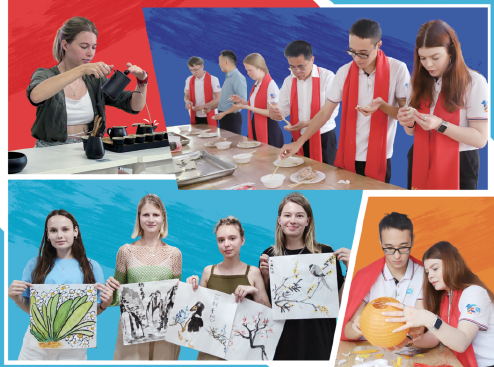
 Top left and bottom left: Russian students at Hainan College of Software Technology explore tea culture and Chinese painting in cultural classes. Top right and bottom right: Russian students try their hand at making dumplings and lanterns during the Lunar New Year celebration event at HNCST on Feb 7, 2024. CHINA DAILY
Top left and bottom left: Russian students at Hainan College of Software Technology explore tea culture and Chinese painting in cultural classes. Top right and bottom right: Russian students try their hand at making dumplings and lanterns during the Lunar New Year celebration event at HNCST on Feb 7, 2024. CHINA DAILY
Russian exchange students in Hainan celebrate Chinese culture and build connections that foster mutual understanding.
Irina Ianshina, an exchange student from Russia, has developed a deep passion for learning Chinese calligraphy since arriving in South China's Hainan province a year ago.
The 24-year-old adopted the Chinese name Lin Wan, carefully selecting characters that phonetically resemble her Russian name, each with a special meaning. "Lin "signifies forest in Chinese, reflecting her love for nature, inspired by her outdoor-filled childhood. "Wan", chosen for its gentle connotations, was recommended by her Chinese friends.
"Many say Chinese is the most challenging language to learn, but I've had a fondness for Chinese culture and even dabbled in calligraphy at school in Moscow when I was 14," Ianshina said.
For many international students unfamiliar with Chinese characters, calligraphy feels more like a form of painting. However, at Hainan College of Software Technology (HNCST) in Qionghai, Ianshina has made impressive progress in calligraphy under the guidance of her teacher Zhou Xiayu, who praised her understanding of character formation and her dedication to practice.
In Ianshina's dormitory, her calligraphy and Chinese painting works adorn the walls.
"These pieces were completed during class," she said, pointing to a lotus flower painting. "My teacher explained the unique symbolism of lotus flowers in China — they grow in mud yet remain pure and flawless."
Ianshina chose to study in Hainan because she loves the pleasant winter temperatures above 20 C, the fresh air, and especially the seafood.
Planning to extend her studies in China, she aims to achieve HSK-4 proficiency, which will enable her to discuss a wider range of topics and communicate more effectively with native speakers.
"Since the college began admitting international students in 2015, we have enrolled over 100 students from Russia, who have demonstrated exceptional academic performance, with most holding undergraduate or advanced degrees," said Chen Huiyang, Party secretary of HNCST.
She explained that, in addition to core Chinese language courses in listening, speaking, reading, and writing, the curriculum for international students includes modules on Chinese culture and an introduction to Hainan's unique characteristics and tourism resources.
Anastasiia Zubkova, a 23-year-old junior from Russia, has a deep admiration for Chinese culture. She noted the similarity between Russians and Hainan locals in their shared love for chicken dishes. She also expressed her fascination with the wide variety of fruits available in Hainan, a diversity she doesn't find in Russia.
According to Chen, to enrich the cultural experience for international students, the college regularly organizes lectures and activities covering diverse topics such as Chinese tea culture, calligraphy, painting, cuisine, baijiu culture, Chinese (Hainan) music, tai chi, and coconut carving.
Chen also highlighted that the college has established partnerships with several universities in Russia.
A place to belong
Aleksei Andreev embarked on a transformative journey as an exchange student from Russia in 2016. Prior to his arrival in Hainan, Andreev had been studying Chinese in evening classes in Russia, a mandatory requirement for his major in professional communication between Europe and Asia, which included learning foreign languages.
Enthralled by the two-week short-term language program at HNCST, Andreev gained a foundational understanding of the Chinese language and culture.
"I developed a deep appreciation for the teachers, campus environment, and new experiences," he said.
Andreev then pursued a one-year program focused on Chinese language at the college, funded by the Hainan provincial government international student scholarship.
After completing his one-year study, Andreev returned to Russia in 2017 to finish his master's degree and work. In 2018, he returned to Hainan for another year of study, ultimately passing the advanced HSK-5 exam.
During his time at HNCST, Andreev engaged in various activities, including playing soccer with Chinese students and locals and participating in martial arts competitions. He also performed Russian songs at the college's music festivals, singing for his fellow students and faculty.
Andreev's passion for Hainan and cultural exchange led him to assist with international student affairs at the college from 2019 to 2021, before transitioning to teaching Russian language and cultural courses at Hainan University in the provincial capital, Haikou. "I hope that by teaching my students about Russia, they will be inspired to pursue studies and careers that connect Russia and China," he said.
Andreev also shared his deep connection to the island province, emphasizing the wealth of possibilities for young people in Hainan.
"With the development of the Hainan Free Trade Port, the province is becoming a more internationally oriented destination, offering a wide range of opportunities for expansion and progress," he said.
Committed to fostering cross-cultural understanding and collaboration between Russia and China, the 30-year-old also engages in translation work for both languages and utilizes social media to showcase the warmth and hospitality of China. He aims to present an authentic view of China to the world, strengthen the bond between the two countries, and promote further investment in Hainan's growing economy.
Party Secretary Chen emphasized the importance of cultivating a new generation of high-quality talent with international perspectives and cross-cultural communication skills to enhance cooperation between China and Russia in fields such as economics, technology, and culture.
"This will lay a solid foundation for the long-term development of the bilateral relationship," Chen noted.
chenbowen@chinadaily.com.cn